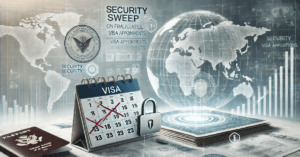US Visa Fraud Crackdown: 2000 Appointments Canceled in Major Security Sweep
The U.S. Embassy in India has canceled 2,000 visa appointments after discovering fraudulent bookings. Officials identified individuals violating scheduling policies and suspended their accounts. This action follows a complaint filed with Delhi Police, leading to a case against over 30 people from Punjab, Haryana, and other states for submitting fake documents between May and August 2024. Investigations revealed that applicants paid agents between ₹1 lakh and ₹15 lakh to manipulate the visa process.
One applicant admitted his agent fabricated job details and financial records, promising success for ₹13 lakh. The U.S. Embassy used IP tracking to uncover fraud networks, prompting legal action under the Bharatiya Nyaya Sanhita and the IT Act. Visa fraud can permanently damage an applicant’s chances of working in the U.S. and may result in a criminal record. U.S. authorities have reaffirmed their zero-tolerance policy and urged applicants to follow legal procedures to avoid long-term consequences.

US Visa Fraud Crackdown: 2000 Appointments Canceled in Major Security Sweep
The U.S. Embassy in India recently canceled approximately 2,000 visa appointments after discovering organized scams within the application booking system. On March 27, embassy officials announced that they had identified individuals manipulating scheduling policies, leading to the immediate suspension of their accounts. This crackdown underscores growing concerns over fraudulent practices affecting the visa process.
Police Case and Fake Documents
The action follows a formal complaint lodged by the embassy with Delhi Police in February 2024. Authorities have since registered a case against more than 30 individuals from states like Punjab and Haryana, accusing them of submitting forged documents to secure U.S. visas. Investigations revealed that between May and August 2024, applicants had provided fake bank statements, educational certificates, and employment records. Shockingly, applicants reportedly paid agents between ₹1 lakh and ₹15 lakh to falsify their applications.
A Case Study: Chamkaur Singh’s Admission
One notable example involves Chamkaur Singh, who confessed during his visa interview that he had never held the job listed in his application. Singh revealed that an agent had fabricated his employment history and submitted counterfeit financial documents for both him and his father. The family had agreed to pay the agent ₹13 lakh, contingent on visa approval. This case highlights the role of intermediaries in exploiting vulnerable applicants desperate to move abroad.
How the Scam Was Uncovered
The embassy utilized advanced technology, including IP address tracking, to detect suspicious patterns in visa applications. By analyzing digital footprints, officials identified networks orchestrating document forgery across multiple submissions. This method exposed coordinated efforts to bypass legal requirements, prompting stricter scrutiny of application data.
Legal Repercussions and Ongoing Raids
Delhi Police have filed charges under India’s new criminal code, the Bharatiya Nyaya Sanhita, and the Information Technology Act. Raids are currently underway to apprehend additional suspects linked to the scam. Authorities emphasize that visa fraud is a serious crime, often resulting in permanent bans from entering the U.S. and potential criminal records. Legal experts caution that foreign judicial systems rarely show leniency in such cases, warning applicants to avoid shortcuts that could ruin future opportunities.
Broader Impact on Visa Aspirants
Engaging in visa fraud carries lifelong consequences. Beyond losing the chance to work or study in the U.S., offenders may face legal action both in India and the U.S., severely damaging their personal and professional reputations. Immigration lawyers stress the importance of transparency, urging applicants to rely on legitimate channels rather than risking their futures with dishonest agents.
H-1B Visa Reforms to Combat Fraud
In parallel with this incident, the U.S. government has tightened regulations for the H-1B visa program, a popular route for skilled foreign workers. In January 2024, the lottery system was revised to ensure fairness and prevent companies from submitting duplicate registrations for the same candidate. Officials disclosed that between 2020 and 2023, nearly 17% of H-1B visas were granted through exploitative loopholes, prompting systemic changes to curb misuse.
Zero-Tolerance Stance Reiterated
The U.S. Embassy has reaffirmed its strict stance against visa fraud, urging applicants to adhere to legal procedures. “Any attempt to deceive the system will result in severe penalties, including permanent ineligibility for U.S. visas,” warned an official. The embassy advises applicants to independently verify agent credentials and avoid sharing sensitive information with unauthorized intermediaries.
A Warning to Future Applicants
This incident serves as a stark reminder of the risks associated with visa fraud. While the temptation to use unethical methods may seem like a quick fix, the long-term repercussions—criminal charges, travel bans, and shattered aspirations—far outweigh any short-term gains. Aspiring travelers are encouraged to prioritize honesty, patience, and compliance with immigration laws to safeguard their chances of building a life abroad.
The U.S. and Indian authorities continue to collaborate in tackling visa-related scams, signaling a united front against organized fraud. As investigations progress, officials hope these measures will restore integrity to the visa process and protect genuine applicants from falling victim to exploitation.
You must be logged in to post a comment.